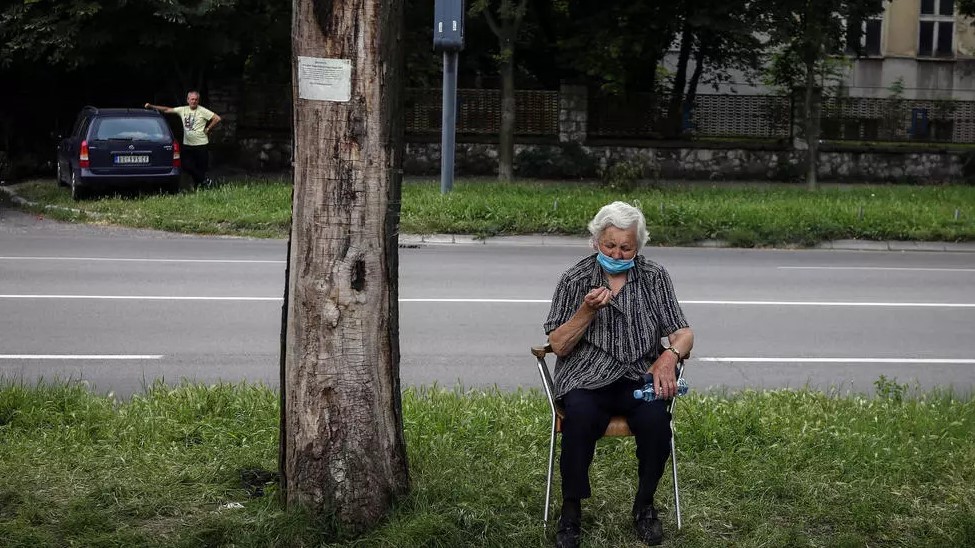As Balkan governments scramble to secure coronavirus vaccines, another foe lurks: an anti-vaccination movement that has been gaining ground and is now trying to grab the spotlight.
With vaccine sceptics ranging from renegade doctors to politicians and Serb tennis champion Novak Djokovic, misinformation about the pandemic has been spreading across social media as fast as the virus itself.
-Of course Serbs will reject that evil deadly thing- a Facebook user wrote about the new Covid-19 jab on the page of a prominent vaccine critic.
-Why do healthy people need a vaccine?- another asked.
Among Europe's poorest nations, the Balkans will already struggle to purchase enough doses to cover their populations.
But countering widespread suspicions will be an additional challenge, as the Western Balkans have become a fertile breeding ground for the international anti-vax movement.
As North Macedonia's President Stevo Pendarovski summed up: -We must not allow... semi-literate charlatans and quack doctors to dominate the biggest names and institutions in science, who have saved millions of lives since the first vaccines appeared.-
His concern is well-founded. In October, a regional survey found that more than half of those questioned in most countries did not plan to get vaccinated, according to the Balkans in Europe Policy Advisory Group (BiEPAG).
For comparison, an Ipsos poll from the same month found that more than 60 percent of people intended to in countries such as Spain, Germany and the US.
Though some may simply be wary of the record-fast development of the Covid-19 shots, the Balkans are also home to a "strikingly" high belief in coronavirus conspiracy theories, BiEPAG found.
For instance, half of the respondents believed the virus was engineered by the Chinese government in a lab, and that the pharmaceutical industry helped its spread.
Around a third believed there is some truth to theories of a link to 5G networks, US military development of bio-weapons, and Bill Gates' intention to chip the world population.
Spanning social and geographical divides, conspiracy beliefs are "deeply embedded in all layers of society" in the Western Balkans, BiEPAG said in its report on a region that includes Serbia, Bosnia, Albania, Kosovo, Montenegro and North Macedonia.
The Balkans has long been a hotbed of misinformation, fuelled by low levels of trust in government and other institutions tainted by corruption and a lack of transparency.
In Serbia, fake news can be found on the front pages of tabloids, which frequently declare the country to be on the brink of a war that never materialises.
Theories about the plots of enemies near and far also run rampant in countries where politicians are eager to shift blame for social and economic ills that have haunted the region since its 1990s wars.
The link to vaccination is worrying because studies show conspiracy theorists are also less likely to get a shot.
Anti-vaccination views "develop easily where people's trust towards authority is low," explained Zoran Radovanovic, a retired professor of epidemiology at the University of Belgrade.
-In the Balkans, after 30 years of deterioration, people don't trust authorities, including medical ones.-
There was scant resistance to vaccines while the region was part of communist Yugoslavia, which crushed Europe's last smallpox outbreak with a mass inoculation effort in the 1970s.
Scepticism has grown over the past five years, initially in response to MMR (measles, rumps and rubella) vaccines, which were falsely linked to autism.
Between 2015 and 2019, Serbia was one of six countries to report a "significant increase" in respondents who believed vaccines are unsafe, according to a study by The Lancet.
In 2018, Serbia reported a major increase in measles cases and deaths, which UNICEF attributed to pockets of non-vaccinated elders and "children under five years of age who were not vaccinated mainly due to parents' hesitancy".
Across the region, suspicions are fanned by a handful of rogue doctors, some of whom have garnered tens of thousands of followers on social media.
Their posts range from pseudoscience -- such as the benefits of walking barefoot for 15 minutes a day -- to articles about alleged dangers of the new Covid-19 vaccines.
In Serbia, the Twitter page of right-wing politician and psychiatrist Jovana Stojkovic was shut down owing to misleading information about vaccines alongside polemics against migrants and the LGBTQ community.
-Doctors either don't know much, don't educate themselves enough or deliberately keep silent about the negative sides of vaccination- she told AFP, rejecting the "anti-vaxxer" label and saying she was for "freedom of choice".
In 2017, a group of doctors pressed charges against Stojkovic for "causing panic" with misinformation about vaccines and other falsehoods, such as a warning that non-vaccinated kids would be "taken from their parents."
Some young scientists are now trying to counter misinformation online.
In a popular Facebook post, a Serbian biomedicine student who is studying in the US broke the Pfizer jab down into its basic building blocks: the mRNA instructions on how to make a coronavirus spike protein, plus fat, salt, sugar and water.
-This vaccine is so natural and organic you can make Grandma's cake out of it- she wrote.
But some mainstream medical professionals are also muddying the waters.
In Croatia, public healthcare doctor Lidija Gajski argued on TV that the technology behind some Covid-19 vaccines had not been convincingly tested, and that the "ratio between benefit and harm is unclear".
And a pulmonologist who previously sat on Serbia's government-appointed crisis team speculated about the shot's "effect on fertility", though there is no data to support such fears.
-You give it to people, without testing it on mice first... that causes unease- Branimir Nestorovic said.
For many in the Balkans, online echo chambers have created a wide divide.
Amna Popovac, 50, "believes in modern science" and is eager to get vaccinated in the Bosnian city of Mostar.
But her 80-year-old mother won't, Popovac says.
-She reads information on Facebook that I consider false, whereas she thinks I'm the one who reads false information.-
